Sustainable Trucking Guide for Supply Chain Managers & Fleet Operators
The report “Transitioning to Low-Carbon Fuel: A Business Guide for Sustainable Trucking in North America” is designed to help fleet operators and their value chain partners comply with new and future regulations.
Business for Social Responsibility, BSR, recently launched “Transitioning to Low-Carbon Fuel: A Business Guide for Sustainable Trucking in North America.”
According to Edward Cameron, director, partnership and research, the report is designed to help fleet operators and their value chain partners comply with new and future regulations.
“Value chain partners include energy producers, vehicle manufacturers, retailers that place shipments, and investors,” he says. “All want to develop impactful yet practical strategies that will accelerate the transition to low-carbon fuels, improve the sustainability impacts of all fuels, and advance dialogue and understanding about our shared challenges.”
This guide addresses five key challenges that have hindered efforts to adopt low-carbon fuel:
- The fuel marketplace is undergoing profound changes. The future mix of available fuels and vehicles is uncertain, and the most cost-effective sources of emissions reductions are diverse and changing.
- Sustainable fuels are not yet scalable. The marketplace lacks cost-effective and large-scale alternatives to conventional, high-carbon, petroleum-based diesel. There is also a lack of fuel infrastructure and vehicle-maintenance equipment to support these fuels. Furthermore, even as new fuels become more attractive, it takes time to rotate new technologies into fleets, where companies amortize assets over many years.
- The sustainability issues are multifaceted. There are many sustainability issues involved that vary between fuel types (e.g. oil, natural gas, and biofuels) as well as within the same type (e.g. Canadian oil sands versus heavy crude from Venezuela). There are trade-offs among issues (e.g. shifting from oil to natural gas may reduce greenhouse gas emissions while raising concerns about pollution from fracking), and getting new low-carbon fuels right requires addressing the potential and perceived concerns about impacts that may occur at untested scales.
- Sustainability standards are underdeveloped. Fleet managers cannot fully understand and manage the lifecycle impacts of fuels because there are no accepted protocols for associating fuels with their full range of lifecycle impacts, and with current fuel systems, it is nearly impossible to track the sources of fuels.
- Key stakeholders disagree about the path to progress. Because so many actors in the transportation fuel system work in isolation, the key stakeholders—such as civil society organizations, economists, and government agencies—do not always agree on which sustainability issues deserve the most attention, nor do they see eye to eye on what is possible for the necessary transformation.
To address these challenges, this guide provides fleet managers with a holistic approach to managing fuel sustainability. In doing so, the guide transforms the challenges mentioned above into opportunities, while giving companies practical guidance about what they can do today.
The guide breaks this process into four steps for trucking companies and companies with large truck fleets:
Step 1: Understand your total fuel footprint. Measure and characterize the size of your company’s fuel-related impacts and the relative significance of fuel versus the other sustainability impacts of your company’s operations.
Step 2: Optimize your use of available fuel and vehicles. Maximize commitments and investments that profitably support the use of low-carbon fuel in the context of the options that are available today.
Step 3: Collaborate to support new low-carbon solutions. Play a constructive role in driving long-term, systemic improvements in the sustainability of the fuel value chain.
Step 4: Advocate for a better policy environment. Work with governments and other stakeholders to promote policies that support more ambitious, effective deployment of low-carbon, sustainable fuel pathways.
The concept of a cross-fuel, lifecycle roadmap for fleet operators is new, but there is a wide variety of tools and approaches to draw from, including fleet-efficiency management, lifecycle assessment, supplier engagement, and policy advocacy. The framework provided in our guide draws connections among the many good case studies and resources that already exist.
This guide builds on BSR’s 2012 report, “The Sustainability Impacts of Fuel: Understanding the Total Sustainability Impacts of Commercial Transportation Fuels,” which assesses the total sustainability impacts of commercial transportation fuels as well as the market outlook for a complete range of fuel types.
That report was aimed at helping large-scale fuel purchasers make viable decisions that lessen impacts on the environment and society and enhance economic growth and development. As that report shows, there is a great deal about sustainability that is not widely understood or managed, and the issues and risks involved are increasing in number.
“BSR’s new companion guide picks up where that report left off by providing companies and stakeholders with a considered, practical approach for addressing these issues and transitioning to low-carbon fuel more proactively,” says Cameron.














